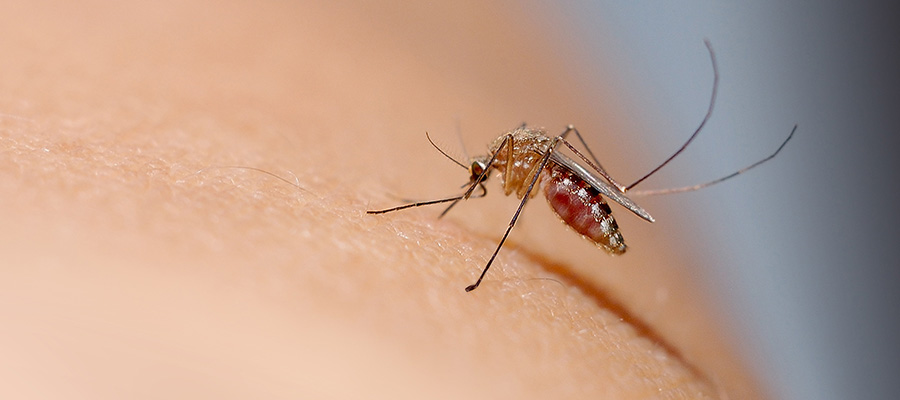Living in a warm climate is ideal for outdoor activities, but it also provides the perfect breeding ground for mosquitoes and mosquito-borne illnesses. But what does this mean, and how can you safeguard your health?
As residents of know, mosquitoes aren't just a backyard nuisance, they carry and transmit diseases.
What You Should Know About Malaria
Malaria is a disease that spreads to people through mosquito bites. In the beginning stages, it often feels like having the flu with symptoms such as shivering, muscle pain, nausea, and fatigue. Most people start experiencing symptoms within four weeks after getting bitten by a mosquito carrying the infection. However, some people may not get sick until much later, even up to a year after they were first infected. If left untreated, it can lead to severe problems like kidney failure, seizures, and other serious conditions. And if you think you might have malaria, it’s crucial to seek immediate medical help for a diagnosis and treatment.Why Are the Recent Malaria Cases Important?
There were locally transmitted cases of mosquito-borne malaria in Florida in September 2023. These recent malaria cases are significant because they mark the first locally transmitted cases in the United States since 2003. For the past 20 years, almost all cases of malaria in the US have been linked to individuals who recently traveled to regions where malaria is more common. Although the current outbreak is not widespread, it’s crucial to contain the disease before it can pose a greater threat within the United States.How Does Malaria Spread?
Despite common misconceptions, malaria cannot be passed from one person to another. It can only be transmitted through mosquitoes that carry the infection. This is why one of the most effective ways to prevent the disease is to avoid getting bitten by mosquitoes.What Is Dengue and How Does it Spread?
Dengue fever is a significant threat in tropical and subtropical climates like Florida. It’s often characterized by high fever, severe headache, pain behind the eyes, joint pain, and rash. The Aedes aegypti mosquito, a common visitor to our area, transmits Dengue. Preventing mosquito bites and eliminating breeding grounds are vital steps in controlling the spread of dengue. Regular mosquito control treatments can reduce the population of these dangerous pests in your surroundings. Dengue is transmitted through the bites of infected Aedes mosquitoes. These mosquitoes are daytime feeders, making daily outdoor activities a potential risk for exposure.Why Are the Recent Dengue Cases Important?
Dengue fever has seen a resurgence in tropical and subtropical regions, including Florida. It's important to recognize the significance of these outbreaks, as dengue can lead to severe flu-like symptoms and, in rare cases, a life-threatening hemorrhagic fever.What Is West Nile Virus?
West Nile virus is the most common mosquito-borne disease in the United States. It is primarily spread by the Culex mosquito. Most people infected with West Nile virus do not feel sick, but it can cause severe symptoms and even neurological diseases in others. Reducing mosquito breeding sites and having regular pest control treatments are effective ways to minimize the risk of West Nile virus in your community.Why Are the Recent West Nile Virus Cases Important?
West Nile virus is currently one of the leading causes of mosquito-borne disease in the continental United States. Most people infected do not feel sick, but it can cause severe and sometimes more serious illnesses in others.How Does West Nile Virus Spread?
West Nile virus spreads through the bite of an infected mosquito. Mosquitoes become infected when they feed on infected birds and can then spread the virus to other animals and humans.Tips for Preventing Mosquito-Borne Diseases
It might feel challenging to avoid mosquitoes, especially during the summertime here in Florida. However, there are several actions you can take to shield yourself from mosquito bites:- Reduce mosquito populations in your surroundings: By minimizing the number of mosquitoes in your area, you can decrease your chances of getting bitten. Since mosquitoes breed in stagnant water, start by getting rid of even the tiniest puddles in your yard. Check areas like gutters, playground equipment, landscaping features, upturned buckets, and any spots where water might accumulate.
- Wear long-sleeved shirts and long pants: While some mosquitoes can bite through clothing, wearing protective garments can make it more difficult for them to reach your skin.
- Avoid going out at dawn and dusk: Mosquitoes are most active during dawn and dusk. Staying indoors during these times can help you steer clear of large mosquito swarms and reduce the likelihood of being bitten.
- Use mosquito netting and check your screens: Prevent mosquitoes from buzzing around your home by repairing any holes in your door and window screens. Consider sleeping under a mosquito net for added protection. You can also use mosquito netting to cover your porch, allowing you to enjoy the outdoors without worrying about bites.
- Apply an EPA-registered repellent: The Environmental Protection Agency provides a list of registered products that can effectively repel mosquitoes and other pests. Visit their website to find the right repellent for your needs and learn how to apply it safely.
- Avoid ineffective DIY methods: There are numerous tips and tricks on the Internet that claim to repel mosquitoes, but many of them are not worth the time, effort, or money—and some may even backfire. Check out our other blog to learn about mosquito prevention tips that are not effective.


